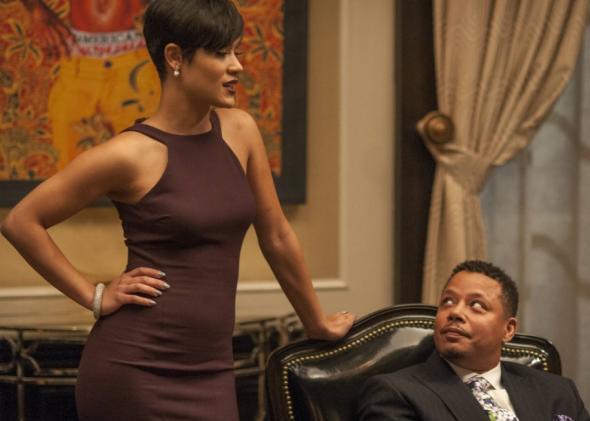I caught on early to Fox’s comically insistent pandering when it came to promoting Empire. There were ads on VH1 and Bravo, home to popular shows with black casts à la Love & Hip-Hop and The Real Housewives of Atlanta, as well as spots on local hip-hop radio stations. Every day for the past two months, before descending into the subway in the mornings, I’ve glanced up at the large billboard featuring the show’s stars, Terrence Howard and Taraji P. Henson, staring down passersby—the callback to Hustle & Flow, their previous film together, all too obvious.
So when Empire premiered, I was skeptical. The show seemed to lean on stereotypes: the same “ghetto fabulous” lifestyle and knack for stirring up melodrama that Bravo has glamorized. I’d never been a fan of Scandal, with its flimsy plots and soapy dialogue. Perhaps most importantly, its fantasy of race-blindness felt so artificial. The way it dodged conversations about the race of its protagonist, at least in the first two seasons I watched, just didn’t seem remotely true to the reality of being black.
Then the buzz around Empire began to build. I heard people whose judgment I trusted raving about it. It’s now the only show in the current TV season to continuously see its audience grow with each new episode, and it’s on pace to become the highest-rated new TV series of the 2014–2015 season. The Jan. 28 episode pulled in more than 11 million viewers for its best ratings so far.
It’s no secret that diversity is a new priority in the TV world. And Empire is, in some ways singlehandedly, changing the calculus behind network television—helping to convince executives that diversity is really worth pushing for. The numbers are hard to argue with: As of the fourth episode, at least 33 percent of black homes were tuning into Empire every week, according to Nielsen. That figure, when broken down by the number of black women age 35–49 who are watching is, as Vulture recently wrote, “literally the equivalent of a Super Bowl.” At least 62 percent of the show’s whole audience is black.
But Vulture’s piece about Empire couched the success of the show in terms of what the networks did for Empire, highlighting their concerted efforts to target black viewers. It seems pretty clear, though, that Fox hadn’t really anticipated what a huge hit it had on its hands. I had a hunch that Empire’s ratings had been driven less by specific engineering on Fox’s part than by black audiences showing up in droves—out of solidarity, and even, you could say, a sense of mission to change TV.
So I put out a call on Twitter and decided to reach out to some devoted black viewers of Empire to try to figure out exactly what was drawing them toward this show. And it turned out that I wasn’t the only one who had felt initially wary. “I already planned not to watch Empire,” one black male viewer told me. Two other black female viewers said they hadn’t heard any of their black peers talking about the show until the very night it premiered. We all started watching for similar reasons: Word of mouth—social media, friends, and family—changed our minds. That kind of communal rallying, most vocal on “Black Twitter,” in support of black programming is a large part of what has made shows with black stars profitable for networks like ABC and now Fox. “I don’t think white people tune in just to support,” says one viewer. “If Halle Berry’s on the cover of Vogue, I’ll buy it on the newsstand because [I think] they need to have more black women on their covers.” For many black viewers, watching Empire can feel like voting with your remote.
The show has drawn even skeptical TV-watchers for several reasons. One is that Empire’s representation of blackness feels unusually nuanced. This is where other shows geared toward black audiences have fallen short. Sure, Scandal got the ball rolling on developing a complicated black female character. But it still, along with Black-ish, mostly aim to signpost “diversity” rather than really unpack what diversity means. “Olivia could be an Asian woman in love with a white president—or a Latino president. Race isn’t the base of that show,” one fan said. “On Empire, the subject matter is hip-hop. It’s very much an urban black experience.” But Empire is attempting to envision a society in which a complicated relationship to your blackness is more a rite of passage than a character flaw.
So last week, I finally sat down to binge-watch Empire. The pounding soundtrack, the overheated script, the high drama—it was mostly as corny as I imagined. Then a subplot involving homophobic Lucious (Howard), a former drug dealer turned hip-hop mogul, and his gay son Jamal (Jussie Smollett), struck me. Instead of presenting some ideal model of a black family, the show puts negative stereotypes of the black community, like homophobia, in context. And I loved its self-awareness about the role of race in the music industry, as when Hakeem and Tiana perform for a mostly white crowd or Lucious adjusts his blackness to make it “presentable” for a news show on which the host is white. The show represents blackness as a “non-defining but present,” as one fan put it, fact of life. Empire isn’t for me, necessarily. But I’m still not going to stop watching.
